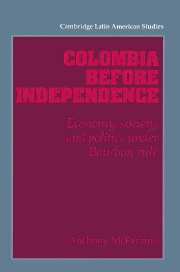Book contents
- Frontmatter
- Contents
- Tables and illustrations
- Acknowledgments
- List of money and measures
- List of abbreviations
- Introduction
- 1 Foundations
- PART I ECONOMY AND SOCIETY IN EIGHTEENTH-CENTURY NEW GRANADA
- PART II THE ECONOMICS OF BOURBON COLONIALISM: NEW GRANADA AND THE ATLANTIC ECONOMY
- 4 New Granada and the Spanish mercantile system, 1700–1778
- 5 Commerce and economy in the age of imperial free trade, 1778–1796
- 6 Merchants and monopoly
- PART III THE POLITICS OF BOURBON COLONIALISM: RECONSTRUCTING THE COLONIAL STATE
- PART IV GOVERNMENT AND POLITICS
- PART V CRISIS IN THE COLONIAL ORDER
- Epilogue
- Appendix A The population of New Granada
- Appendix B Gold production
- Appendix C Shipping and commerce
- Bibliography
- Index
- CAMBRIDGE LATIN AMERICAN STUDIES
6 - Merchants and monopoly
Published online by Cambridge University Press: 17 September 2009
- Frontmatter
- Contents
- Tables and illustrations
- Acknowledgments
- List of money and measures
- List of abbreviations
- Introduction
- 1 Foundations
- PART I ECONOMY AND SOCIETY IN EIGHTEENTH-CENTURY NEW GRANADA
- PART II THE ECONOMICS OF BOURBON COLONIALISM: NEW GRANADA AND THE ATLANTIC ECONOMY
- 4 New Granada and the Spanish mercantile system, 1700–1778
- 5 Commerce and economy in the age of imperial free trade, 1778–1796
- 6 Merchants and monopoly
- PART III THE POLITICS OF BOURBON COLONIALISM: RECONSTRUCTING THE COLONIAL STATE
- PART IV GOVERNMENT AND POLITICS
- PART V CRISIS IN THE COLONIAL ORDER
- Epilogue
- Appendix A The population of New Granada
- Appendix B Gold production
- Appendix C Shipping and commerce
- Bibliography
- Index
- CAMBRIDGE LATIN AMERICAN STUDIES
Summary
At the beginning of the eighteenth century, New Granada lacked a substantial and influential merchant class of the kind found in Peru and Mexico. In 1695, a group of some twenty merchants in Bogotá had established a consulado de comercio modeled on those of Lima and Mexico City, by contracting with the crown to pay the royal tax known as the avería, due on goods imported by the galleons, in return for the right to a self-governing mercantile jurisdiction. The Consulado of Santa Fe de Bogotá did not survive for long, however. Its members were unable to fulfill their financial obligations, and when the galleon system itself collapsed during the War of the Spanish Succession the Consulado lost its rationale. It was suppressed in 1713, reflecting the inability of New Granadan merchants to sustain an institution of this kind. Many decades then passed before a consulado de comercio was reestablished in New Granada. When the institution was revived in 1795, it was at Cartagena de Indias, the country's leading port and home of its mercantile elite.
Cartagena de Indias and New Granada's commerce
Although Bogotá was the headquarters of New Granada's government, Cartagena was the hub of its commerce and throughout the eighteenth century the development of a mercantile elite in New Granada was primarily associated with this port.
- Type
- Chapter
- Information
- Colombia before IndependenceEconomy, Society, and Politics under Bourbon Rule, pp. 164 - 184Publisher: Cambridge University PressPrint publication year: 1993



